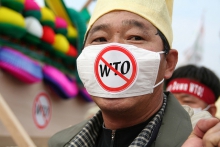PSI urges WTO to deal with development issues

The letter was sent to all WTO members meeting in Sydney, to try to ensure that the G20 is not used again to achieve the agenda of the transnational corporations of the developed countries. PSI has long been critical of the WTO for pushing ahead with liberalisation without adequately dealing with developing country issues.
At the WTO Ministerial held in Bali in December 2013, WTO members agreed to the first expansion of the WTO since its coming into existence in 1995. The new agreement on “Trade Facilitation,” would divert limited resources away from priority development needs such as health, education, and domestic infrastructure investments in least developed countries (LDCs) and developing countries. (Nearly 200 organisations opposed this Trade Facilitation Agreement [TFA] last year - Our World is not for Sale released this statement on the Bali outcome.) As we have seen time and time again, the issues of urgency for developing countries, such as the G33 proposal to allow developing countries to invest in Food Security, were side-lined at Bali, and the LDC proposals were concluded only in a non-binding way.
Since the Bali Ministerial, however, developing countries and LDCs have fought to ensure that the new TFA only enters into force when their development demands – to change the most harmful aspects of existing WTO rules – are also agreed. Outrageously, the Director General of the WTO, Roberto Azevêdo, along with officials from the US, Japan, the EU and other developed countries, have been putting immense pressure on developing countries and LDCs to ‘give in,’ and accept that the only “early harvest” from the Doha Round will be the TFA. If this happens, it will be even harder to ensure that the development demands – many of which are similar to civil society demands, such as changing the agriculture rules to allow developing countries to invest in agricultural production of small farmers for food security – are ever taken up by WTO members.
PSI continues to fight to protect public services from harmful trade agreements but also fights for the rights of developing nations to benefit from a trade regime that facilitates development.

